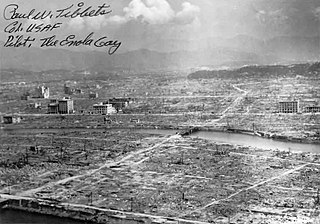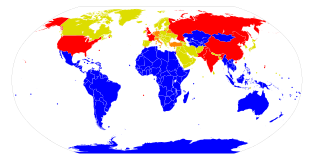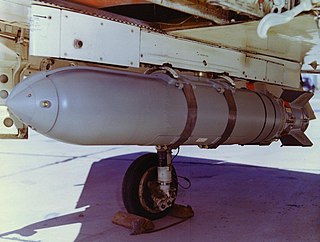
The Treaty on the Non-Proliferation of Nuclear Weapons, commonly known as the Non-Proliferation Treaty or NPT, is an international treaty whose objective is to prevent the spread of nuclear weapons and weapons technology, to promote cooperation in the peaceful uses of nuclear energy, and to further the goal of achieving nuclear disarmament and general and complete disarmament. Between 1965 and 1968, the treaty was negotiated by the Eighteen Nation Committee on Disarmament, a United Nations-sponsored organization based in Geneva, Switzerland.

Nuclear proliferation is the spread of nuclear weapons, fissionable material, and weapons-applicable nuclear technology and information to nations not recognized as "Nuclear Weapon States" by the Treaty on the Non-Proliferation of Nuclear Weapons, commonly known as the Non-Proliferation Treaty or NPT. Proliferation has been opposed by many nations with and without nuclear weapons, as governments fear that more countries with nuclear weapons will increase the possibility of nuclear warfare, de-stabilize international or regional relations, or infringe upon the national sovereignty of nation states.

Nuclear disarmament is the act of reducing or eliminating nuclear weapons. Its end state can also be a nuclear-weapons-free world, in which nuclear weapons are completely eliminated. The term denuclearization is also used to describe the process leading to complete nuclear disarmament.
Arms control is a term for international restrictions upon the development, production, stockpiling, proliferation and usage of small arms, conventional weapons, and weapons of mass destruction. Historically, arms control may apply to melee weapons before the invention of firearm. Arms control is typically exercised through the use of diplomacy which seeks to impose such limitations upon consenting participants through international treaties and agreements, although it may also comprise efforts by a nation or group of nations to enforce limitations upon a non-consenting country.

The Pugwash Conferences on Science and World Affairs is an international organization that brings together scholars and public figures to work toward reducing the danger of armed conflict and to seek solutions to global security threats. It was founded in 1957 by Joseph Rotblat and Bertrand Russell in Pugwash, Nova Scotia, Canada, following the release of the Russell–Einstein Manifesto in 1955.

Israel is widely believed to possess weapons of mass destruction, and to be one of four nuclear-armed countries not recognized as a Nuclear Weapons State by the Non-Proliferation Treaty (NPT). The US Congress Office of Technology Assessment has recorded Israel as a country generally reported as having undeclared chemical warfare capabilities, and an offensive biological warfare program. Officially, Israel neither confirms nor denies possessing nuclear weapons.

As the collapse of the Soviet Union appeared imminent, the United States and their NATO allies grew concerned of the risk of nuclear weapons held in the Soviet republics falling into enemy hands. The Cooperative Threat Reduction (CTR) program was initiated by the Nunn–Lugar Act, which was authored and cosponsored by Sens. Sam Nunn (D-GA) and Richard Lugar (R-IN). According to the CTR website, the purpose of the CTR Program was originally "to secure and dismantle weapons of mass destruction and their associated infrastructure in former Soviet Union states." As the peace dividend grew old, an alternative 2009 explanation of the program was "to secure and dismantle weapons of mass destruction in states of the former Soviet Union and beyond". The CTR program funds have been disbursed since 1997 by the Defense Threat Reduction Agency (DTRA).

The nuclear weapons debate refers to the controversies surrounding the threat, use and stockpiling of nuclear weapons. Even before the first nuclear weapons had been developed, scientists involved with the Manhattan Project were divided over the use of the weapon. The only time nuclear weapons have been used in warfare was during the final stages of World War II when USAAF B-29 Superfortress bombers dropped atomic bombs on the Japanese cities of Hiroshima and Nagasaki in early August 1945. The role of the bombings in Japan's surrender and the U.S.'s ethical justification for them have been the subject of scholarly and popular debate for decades.

Robert G. Joseph is a senior scholar at the National Institute for Public Policy. He was the United States Special Envoy for Nuclear Nonproliferation, with ambassadorial rank. Prior to this post, Joseph was the Under Secretary of State for Arms Control and International Security, a position he held until January 24, 2007. Joseph is known for being instrumental in creating the Proliferation Security Initiative and as the architect of the Global Initiative to Combat Nuclear Terrorism. He was also the US chief negotiator to Libya in 2003 who convinced the Libyans to give up their WMD programs. He also recently authored a book describing his experience in negotiating with Libya entitled "Countering WMD."

Joseph Cirincione (, SIR-in-see-OWN-ee is a national security analyst and author. He served as the president of the Ploughshares Fund, a public grant-making foundation focused on nuclear nonproliferation and conflict resolution.

The Nuclear Age Peace Foundation (NAPF) is a non-profit, non-partisan international education and advocacy organization. Founded in 1982, NAPF is composed of individuals and organizations from all over the world. It has consultative status to the United Nations Economic and Social Council and is recognized by the UN as a Peace Messenger Organization.
Frank N. von Hippel is an American physicist. He is Professor and Co-Director of Program on Science and Global Security at Princeton University and the Princeton School of Public and International Affairs.

Robert Gibbins Gard Jr. is a retired United States Army lieutenant general and former chairman of the board of the Center for Arms Control and Non-Proliferation where his work focuses on nuclear nonproliferation, missile defense, Iraq, Iran, military policy, nuclear terrorism, and other national security issues.

United Nations Security Council resolution 1540 was adopted unanimously on 28 April 2004 regarding the non-proliferation of weapons of mass destruction. The resolution establishes the obligations under Chapter VII of the United Nations Charter for all member states to develop and enforce appropriate legal and regulatory measures against the proliferation of chemical, biological, radiological, and nuclear weapons and their means of delivery, in particular, to prevent the spread of weapons of mass destruction to non-state actors.
The International Luxembourg Forum on Preventing Nuclear Catastrophe — is an international non-governmental organisation uniting leading world-renowned experts on non-proliferation of nuclear weapons, materials and delivery vehicles.

United Nations Security Council Resolution 1887, adopted unanimously on 24 September 2009, the Council addressed non-proliferation and the prevention of the spread of weapons of mass destruction in the world.
A security assurance, in the context of nuclear warfare, is an expression of a political position by a nuclear-armed nation intended to placate other non-nuclear-armed nations. There are two types of security assurance: positive and negative. A positive assurance states that the nation giving it will aid any or a particular non-nuclear-armed nation in retaliation if it is a victim of nuclear attack. A negative assurance is not the opposite but instead means that a nuclear-armed nation has promised not to use nuclear weapons except in retaliation for a nuclear attack against itself.

United Nations Security Council Resolution 1673, adopted unanimously on April 27, 2006, after considering a report from the Committee of the Security Council established in Resolution 1540 (2004) concerning non-proliferation, the Council extended the mandate of the Committee monitoring the resolution's implementation concerning weapons of mass destruction and their means of delivery until April 27, 2008.
Thomas Graham Jr. is a former senior U.S. diplomat. Graham was involved in the negotiation of every single international arms control and non-proliferation agreement from 1970 to 1997. This includes the Strategic Arms Limitation Talks, the Strategic Arms Reduction Treaties, the Anti-ballistic missile (ABM) Treaty, Intermediate-Range Nuclear Forces Treaty (INF) Treaty, Treaty on the Non-Proliferation of Nuclear Weapons Treaty (NPT), Treaty on Conventional Armed Forces in Europe (CFE) Treaty and Comprehensive Nuclear-Test-Ban Treaty (CTBT). In 1993, Ambassador Graham served as acting director of the Arms Control and Disarmament Agency (ACDA) from January to November, 1993 and Acting Deputy Director from November, 1993 to July, 1994. From 1994 through 1997, he was president Bill Clinton's special representative for Arms Control, Non-Proliferation, and Disarmament. Graham successfully led the U.S. government efforts to achieve the permanent extension of the NPT in 1995. Graham also served for 15 years as the general counsel of ACDA. Throughout his career, Thomas Graham has worked with six U.S. Presidents including Presidents Richard Nixon, Gerald Ford, Jimmy Carter, Ronald Reagan, George H. W. Bush, and Bill Clinton. Ambassador Graham worked on the negotiation of the Chemical Weapons Convention and the Biological Weapons Convention and managed the Senate approval of the ratification of the Geneva Protocol banning the use of chemical and biological weapons in war, as well as the Biological Weapons Convention.

Bonnie Denise Jenkins is an expert on arms control and nonproliferation of weapons of mass destruction and currently serves as the under secretary of state for arms control and international security affairs. During the Obama administration, she was the U.S. Department of State's coordinator for threat reduction programs in the Bureau of International Security and Nonproliferation.













